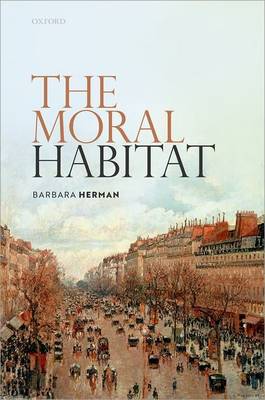
Door een staking bij bpost kan je online bestelling op dit moment iets langer onderweg zijn dan voorzien. Dringend iets nodig? Onze winkels ontvangen jou met open armen!
- Afhalen na 1 uur in een winkel met voorraad
- Gratis thuislevering in België vanaf € 30
- Ruim aanbod met 7 miljoen producten
Door een staking bij bpost kan je online bestelling op dit moment iets langer onderweg zijn dan voorzien. Dringend iets nodig? Onze winkels ontvangen jou met open armen!
- Afhalen na 1 uur in een winkel met voorraad
- Gratis thuislevering in België vanaf € 30
- Ruim aanbod met 7 miljoen producten
Zoeken
Omschrijving
In The Moral Habitat, Barbara Herman offers a new and systematic interpretation of Kant's moral and political philosophy. The study begins with an investigation of some understudied imperfect duties which, surprisingly, tell us some important but generally unnoticed facts about what it is to be a moral agent. The second part of the book launches a substantial reinterpretation of Kant's ethics as a system of duties, juridical and ethical, perfect and imperfect, that can incorporate what we learn from imperfect duties and do much more. This system of duties provides the structure for what Herman calls a moral habitat: a made environment, created by and for free and equal persons living together. It is a dynamic system, with duties from different spheres shaping and being affected by each other, each level further interpreting its core anti-subordination value. In the final part, Herman takes up some implications and applications of this moral habitat idea. From considering what would be involved, morally, in recognizing a human right to housing to some meta-ethical issues about objectivity and our responsibility for moral change, we come to appreciate the resources of this holistic agent-centered Kantian view of morality.
Specificaties
Betrokkenen
- Auteur(s):
- Uitgeverij:
Inhoud
- Aantal bladzijden:
- 266
- Taal:
- Engels
Eigenschappen
- Productcode (EAN):
- 9780192896353
- Verschijningsdatum:
- 21/01/2022
- Uitvoering:
- Hardcover
- Formaat:
- Genaaid
- Afmetingen:
- 152 mm x 229 mm
- Gewicht:
- 544 g

Alleen bij Standaard Boekhandel
+ 141 punten op je klantenkaart van Standaard Boekhandel
Beoordelingen
We publiceren alleen reviews die voldoen aan de voorwaarden voor reviews. Bekijk onze voorwaarden voor reviews.











